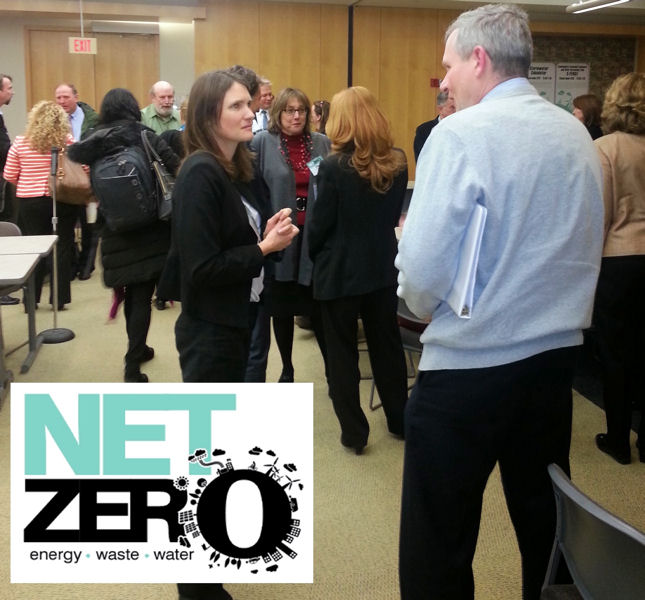
From left, Alicia Chakrabarti, Water Environment Federation (Alexandria, Va.) member and associate engineer at East Bay Municipal Utility District (Oakland, Calif.), discusses net zero with Mark Kodak, senior fellow at the Army Environmental Policy Institute. WEF staff photo/Barry Liner.
Water sector leaders representing the Water Environment Federation (WEF; Alexandria, Va.) attended a “net zero” workshop on Feb. 25 to develop a resource document and roadmap that will help communities and partners reduce waste, and water- and energy-footprints at a local level.
Professionals from various disciplines attended the U.S. Environmental Protection Agency (EPA) workshop, “Promoting Sustainability Through Net Zero Strategies,” held at EPA’s Research Triangle Park in Durham, N.C. to develop a resource document and roadmap that will help implement these initiatives.
“Simply put, ‘net zero’ means consuming only as much energy as produced, achieving a sustainable balance between water availability and demand, and eliminating solid waste sent to landfills,” said Barry Liner, director of WEF’s Water Science and Engineering Center.
“The workshop objectives were to share lessons learned from net zero waste, water, and energy efforts in communities including successes, challenges, and needs, and to identify common themes and cross-cutting issues,” Liner said.
With a focus on successes, the workshop presented the joint net zero efforts of the EPA and U.S. Army to conserve water, reduce energy use, and eliminate solid waste as a way to improve the environment, save money, and help communities become more sustainable and resilient, Liner said. EPA researchers assisted in the effort by developing and implementing strategies, approaches, and technologies.
Bob Perciasepe, EPA deputy administrator, and Katherine Hammack, assistant secretary of the Army for Installations, Energy, and Environment officiated the workshop. Alicia Chakrabarti of East Bay Municipal Utilities District (Oakland, Calif.) and vice chair of the WEF Energy Task Force Paula Kehoe of the San Francisco Public Utilities Commission, also participated.
“EPA’s research will focus on pooling federal, state and local expertise and resources to make a positive impact on a grand scale while fostering economic growth and promoting citizen health and well-being,” Liner said.








April 8, 2014
WEF Resources & Efforts